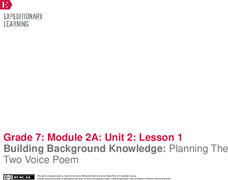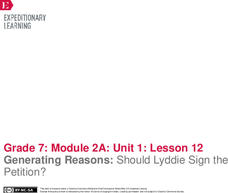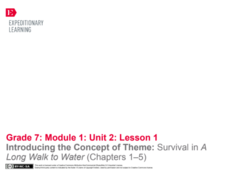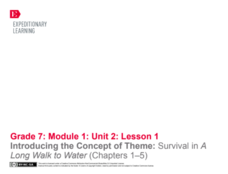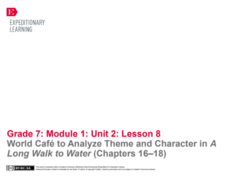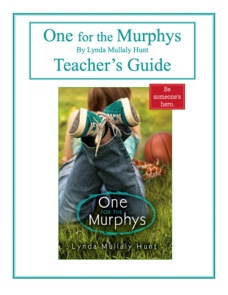EngageNY
Setting a Purpose for Research: Introduction to Media Literacy
What does that picture say? Young historians take a close look at a British advertisement from 1890 to determine the role of gender in advertising. They discuss the implications about women portrayed in the images. Pupils then further...
EngageNY
Performance Task: Planning the Final Brochure
Partners use a Brochure Planning Guide to create brochures giving advice to consumers about products based on the research they finished about working conditions. After planning the brochure, they complete a sketch outline and then begin...
EngageNY
Building Background Knowledge: Planning The Two Voice Poem
Scholars build background knowledge to understand the life and work of the union leader and labor organizer César Chávez. As they read teacher-selected resources, they complete a Building Background Knowledge worksheet and engage in...
EngageNY
World Café to Analyze the Characters in Lyddie
Order up! Welcome to the World Café, where scholars engage in small-group discussions based on Katherine Paterson's novel Lyddie. As pupils circulate around the room, they talk with classmates about the novel's characters, setting, and...
EngageNY
Generating Reasons: Should Lyddie Sign the Petition?
Scholars synthesize evidence from Katherine Paterson's Lyddie to create a list of the pros and cons of Lyddie signing a petition about working conditions. They use the Lyddie's Decision anchor chart to record their thoughts and ideas...
EngageNY
Forming Evidence-Based Claims: Should Lyddie Sign the Petition?
Pupils reread selected passages from Katherine Paterson's novel Lyddie. After they finish, individuals gather textual evidence supporting whether Lyddie should sign a controversial petition and record their findings on graphic organizers.
EngageNY
Framing Lyddie’s Decision and Practicing Evidence Based Claims
Scholars grapple with whether the title character of Katherine Paterson's novel, Lyddie, should sign a petition about working conditions at the factory. They engage in close reading and discussion before adding their thinking about the...
EngageNY
Introducing Working Conditions in the Mills
Scholars discover how working in a textile mill in the nineteenth century affected the title character from Katherine Paterson's novel, Lyddie. Partners analyze quotes from the novel and then add evidence and questions about working...
EngageNY
Analyzing Character: Who is Lyddie?
Character analysis can help readers feel more connected to a literary text. Scholars explore the topic by writing an acrostic poem about the main character from Katherine Paterson's novel, Lyddie. Then, pupils watch a short video to help...
EngageNY
Modeling Entry Task, Reading Notes, and Reading Strategies for Lyddie
Readers understand a text better when they discuss it with someone else. Scholars continue reading the novel Lyddie by Katherine Paterson, engaging in text-related discussions with five classmates. Next, they add to their chapter three...
EngageNY
Setting Purpose for Research: What are Fair Working Conditions?
Life may not be fair but working conditions should be. Scholars research working conditions at Wegmans by studying the company website. They complete a working conditions anchor chart and discuss their findings in a think-pair-share...
EngageNY
Analyzing Word Choice: Understanding Working Conditions in the Mills
Ravenous or hungry, happy or ecstatic—why does word choice matter? Scholars continue to analyze working conditions in the mill and how the conditions affect the protagonist of Katherine Paterson's novel, Lyddie. They engage in a close...
EngageNY
Close Reading to Learn about Lyddie’s Character
Scholars work in pairs to analyze the characters, plot, and setting of Katherine Paterson's novel, Lyddie. Next, they apply what they learned about the characters' feelings and motivation to perform a mini reader's theater.
EngageNY
Introducing Module 2: Working Conditions—Then and Now
Let's get visual! Scholars embark on a gallery walk around the classroom to view quotes, images, and videos about historical and modern working conditions in various professions. They consider how working conditions have changed over...
EngageNY
Introducing the Concept of Theme: Survival in A Long Walk to Water (Chapters 1–5)
Teach the class how to survive! Scholars work together to learn the meaning of theme and determine the message in A Long Walk to Water. After the class discusses possible ideas, they work to identify one central theme for the text. The...
EngageNY
Analyzing the Central Ideas, Part 2: “The Border”
Writers use the Short Response Graphic Organizer: The Border to learn how to answer short response questions. After completing the organizer, they rotate among classmates conducting peer critiques of their work.
EngageNY
World Café to Analyze Theme and Character in A Long Walk to Water (Chapters 16–18)
Here comes a surprise ending! Readers discuss their thoughts about the ending of A Long Walk to Water by answering probing questions. They participate in a World Café where they work in triads to complete a chart and a prompt during...
Transforming Education
Social Awareness Strategies
What are the benefits of developing social awareness? Using the resource, readers learn strategies for fostering civil discourse, creating a participatory classroom, and enhancing family involvement. Scholars also take a personality...
Curated OER
Myth and Truth: The First Thanksgiving
Encourage learners to think critically about common myths regarding the Wampanoag Indians in Colonial America. They discover that behind every myth are many possible explanations—and that learning more about American history helps them...
Penguin Books
One for the Murphys by Lynda Mullaly Hunt - Teacher's Guide
Children in foster care face a lot of uncertainty in their lives. A guide for the novel One for the Murphys introduces a main character, Carley, who is thrust into the foster care system. Chapter-by-chapter questions cover key details in...
Read Write Think
Book Report Alternative: Rewind the Plot!
Have you ever looked for a new way to teach an old concept? Scholars thinking about the rising action of a story in a whole new perspective. However, Book Report Alternative: Rewind the Plot! challenges readers and allows for much...
Equality and Human Rights Commission
Diversity
Eighty-seven percent of people living in the United Kingdom identify as white, and some of those struggle to understand the importance of diversity in society. Scholars use presentations, discussions, and activities to address diversity...
Equality and Human Rights Commission
Balancing Human Rights
Everyone appreciates human rights, but what happens if the rights of an individual conflict with the rights of the larger group? Scholars explore real-life scenarios and debate when to limit rights and when to strictly enforce them. The...
Equality and Human Rights Commission
Equality
Despite passing the Equality Act in 2010 covering many groups, gender inequality in Great Britain remains. Scholars investigate the concept of equality with a presentation, discussion, and hands-on timeline activities. The seventh lesson...




